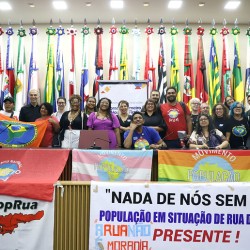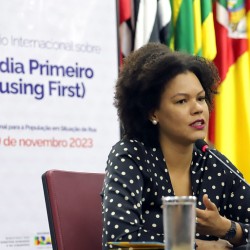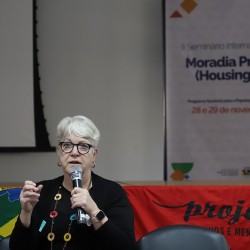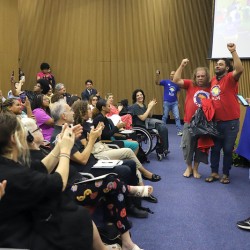PROJECTS
Advancing Housing First in Brazil: A Human Rights Approach to Ending Homelessness
The Centre for Mental Health, Human Rights, and Social Justice is collaborating with the Brazilian Ministry of Human Rights and Citizenship and Ministry of Justice to support the development of a national Housing First policy that prioritizes human rights in addressing homelessness, particularly for individuals with psychosocial disabilities.
This initiative is part of a broader national effort to uphold the right to housing and provide sustainable, dignity-centered solutions to homelessness. President Luís Inácio Lula da Silva has affirmed his commitment to the program, announcing a national homelessness plan on December 11, 2023, with an initial budget of 1 billion Reais.
Placing human rights at the forefront of social housing policy.
In November 2023, the Centre co-organized an International Seminar in Brasília in partnership with the Ministry of Human Rights and Citizenship, Ministry of Justice, the State University of Sao Paulo (UNESP) and Columbia University, bringing together global experts to exchange knowledge and strategies for Housing First implementation.
Beyond policy development, the Centre is actively working with local organizations implementing Housing First programs to assess their effectiveness and alignment with human rights standards. Through expert consultations, research, and ongoing advocacy, we are committed to ensuring that Brazil’s Housing First model sets a new standard for rights-based approaches to housing and social inclusion.
PROJECTS
Mad Thinking
Mad Thinking is a knowledge exchange initiative advancing the rights and inclusion of persons with psychosocial disabilities by connecting researchers, advocates, activists, and survivors across the global South and North.
In collaboration with the Centre for Mental Health, Human Rights, and Social Justice, and supported by the Symposium on Strength and Solidarity for Human Rights, the initiative organised the Disability Symposium on Strength and Solidarity for Human Rights which brought together 21 rights defenders and organizers in June, 2024 to participate in a 5-day immersive event to address challenges, share strategies, and foster solidarity.
Symposium Objectives, Themes and Next Steps
• Building Power and Solidarity: Focused on understanding how to build power within the movement, including exploring the dynamics of asking for and responding to calls for solidarity.
• Organizational Health and Respect: Examined the health and culture of disability rights organizations, including democratizing structures, promoting diverse leadership, and creating cultures of care and respect.
• Exploring Difference and Intersectionality: Sought to understand the complexities of disability identity, including intersectionality, and how these can be sources of strength.
• Reflecting on Tactics and Strategies: Delved into strategic choices and how efforts to build solidarity can misfire.
Next Steps: Mad Thinking will build on the key themes of the symposium and create spaces, tools, and opportunities to explore key questions about power, leadership, organisational strength, and solidarity. Its broader aim is to spark fresh ideas and energy to challenge the status quo and to transform, democratise, and revitalise disability movements.
PROJECTS
(Un)Mapping Global Mental Health
(Un)Mapping Global Mental Health involves participatory research into the discourses, people, institutions, and money that make up Global Mental Health (GMH). The project, led by Dr. China Mills, Akriti Mehta, Julie Hannah, and Alberto Vásquez Encalada, conducted three participatory research workshops to explore how knowledge in global mental health is produced, who holds power, and what perspectives are included or excluded.

The workshops engaged people with lived experience, activists, and professionals from Kenya, Mexico, Nigeria, Singapore, Chile, Pakistan, Uganda, Canada, Lebanon, and India, leading to a re-imagined research framework emphasizing justice. The research revealed that global mental health is less bounded than initially thought, with diffuse power structures and no singular authority defining it. Through these workshops, a new framework emerged, integrating five pillars and six intersecting themes, with participants emphasizing the need for a stronger focus on justice.
Moving forward, the team aims to form a larger multidisciplinary research group, centering lived experience and participatory methods. They will hold individual discussions to assess expertise and interest, develop a research proposal, co-write publications, and submit a co-produced grant application in early 2025.
PROJECTS
Dialogues
The Handover Dialogues documents the legacy of work produced by Dr. Dainius Pūras, who became the first medical doctor to be appointed Special Rapporteur on the right to physical and mental health. In 2020, Dr. Pūras ended his tenure with the appointment of Tlaleng Mofokeng, another historic appointment as the first woman and first person from the global South to hold this post.
PROJECTS
Transitions: Rethinking Psychiatric Deinstitutionalization in South America
The Transitions project is redefining the history of psychiatric reform by examining the ethical and political complexities of deinstitutionalization (PDI) in Brazil and Chile. Led by Dr. Cristian Montenegro at King’s College London, this research challenges Eurocentric narratives and explores how global mental health policies have been reshaped in South America.
PROJECTS
Reproductive Justice: Advancing Rights-Based Approaches to Maternal Mental Health
Drs. Alicia Yamin and Lisa Cosgrove’s recent study, published in Sexual and Reproductive Health Matters (2025), critically examines the framing of postpartum depression treatments and their impact on women’s autonomy. Dr. Cosgrove is also leading a critical review of zuranolone, the newly approved “first-ever” pill for postpartum depression, assessing its clinical trial data for efficacy and safety. Her latest research project on maternal mental health, launched in November 2024, investigates how corporate-backed mental health campaigns shape public perception and policy, often undermining reproductive agency. By integrating research, policy advocacy, and public discourse, the Centre is driving a rights-based approach to maternal mental health— one that prioritizes autonomy, dignity, and evidence over profit-driven solutions.
Let's revolutionise mental health
Our work would not be possible without the generosity and support of our donors. Discover how you can join us in our mission to transform mental health.




